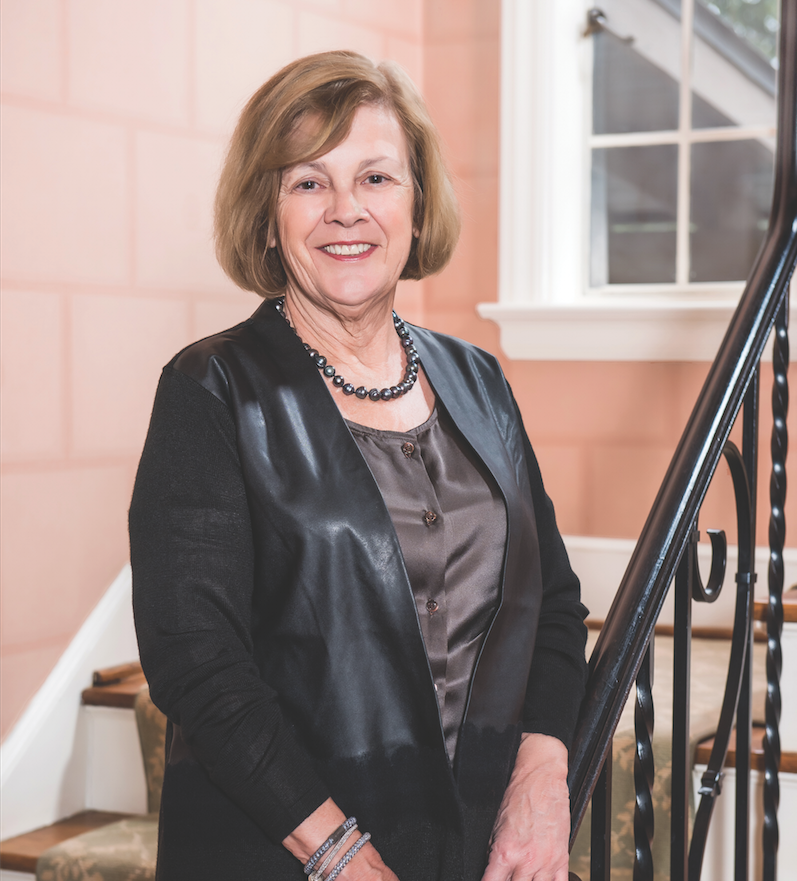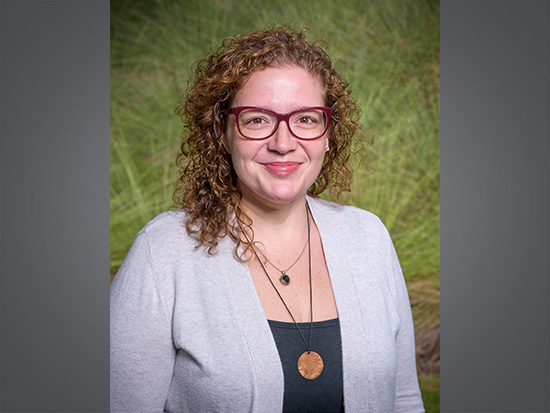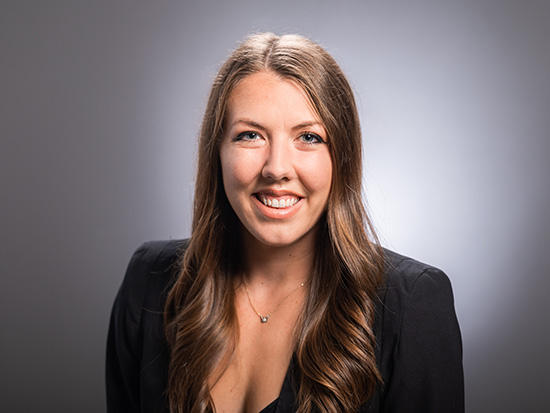Gillian Goodrich studied history. Today, she’s helping to create it.
Gillian Goodrich’s love of history began at an early age, sitting with her father, Birmingham attorney William Bew White of Bradley Arant Rose & White (now Bradley Arant Boult Cummings) and discussing the events of the past.
 That love extended through her years at Brooke Hill School—the college preparatory girls school that merged with Birmingham University School in 1975 to form The Altamont School—and on through her education at Converse College, a women’s college located in Spartanburg, South Carolina. Her interest was so strong, in fact, that she realized as an undergraduate that she wanted to go on to graduate school in history. “I knew I wanted to get my master’s degree,” Goodrich says. “So after I graduated and married my husband, Mike, I started working on my M.A. at Alabama while he was in law school there.”
That love extended through her years at Brooke Hill School—the college preparatory girls school that merged with Birmingham University School in 1975 to form The Altamont School—and on through her education at Converse College, a women’s college located in Spartanburg, South Carolina. Her interest was so strong, in fact, that she realized as an undergraduate that she wanted to go on to graduate school in history. “I knew I wanted to get my master’s degree,” Goodrich says. “So after I graduated and married my husband, Mike, I started working on my M.A. at Alabama while he was in law school there.”New Perspectives
Although the Goodriches weren’t in Tuscaloosa for very long, their brief time there brought tremendous change to Gillian’s life and viewpoint. “My first year, I taught at Tuscaloosa High School, and that was the first time I had been in a co-ed classroom since I was in elementary school,” she says. “My second year, I taught at Westlawn Junior High, and I was one of the first white teachers they’d ever had—this wasn’t too long after the schools were integrated. Working in those schools was another whole learning experience for me.”After Mike finished his law degree, the couple moved back to Birmingham, and Gillian resumed her graduate studies at the still-new University of Alabama at Birmingham. Completing her degree while raising a young family wasn’t easy, but Goodrich says that the guidance she received from professor emerita Dr. Virginia Van Der Veer Hamilton was invaluable. “She was really my academic mentor,” Goodrich says. “I took her Southern history course and we read W.J. Cash’s “Mind of the South.” She really opened my eyes up to how much our [Southern] history has set us aside and how we should and could be different.

“Back then, the master’s degree in history required that you complete a thesis,” she continues. “I decided to write about Judge James Horton, who presided over the Decatur re-trials of the Scottsboro Boys. He had overturned the jury verdict [that found defendant Haywood Patterson guilty], and that was the end of his career. My thesis explored the implications of that decision.”
 Mike had clerked for Howell Heflin, and that connection led Gillian to the Horton family, which had saved Judge Horton’s documentation from the trial. “There were stacks of materials under the bed, mail from all over the world,” Goodrich says. “There were letters from people who wrote to him criticizing his decision and also from people praising his courage.” She finished her degree in 1974. “It was a slow path,” she admits. “But having a mentor was important. Dr. Hamilton taught me how to be critical and thorough in my research, sifting through both point of view and facts to know what really happened as best you can. And those skills also help you think about the present and the future—examining the issues in a thoughtful and creative way.”
Mike had clerked for Howell Heflin, and that connection led Gillian to the Horton family, which had saved Judge Horton’s documentation from the trial. “There were stacks of materials under the bed, mail from all over the world,” Goodrich says. “There were letters from people who wrote to him criticizing his decision and also from people praising his courage.” She finished her degree in 1974. “It was a slow path,” she admits. “But having a mentor was important. Dr. Hamilton taught me how to be critical and thorough in my research, sifting through both point of view and facts to know what really happened as best you can. And those skills also help you think about the present and the future—examining the issues in a thoughtful and creative way.”Goodrich had every intention to pursue her Ph.D. in history but never found the time. After spending time at home with her young children, she returned to the UAB in the 1990s as an instructor in the Department of History, this time with a focus on American history. “I did that for about 10 years,” she says. “UAB was really growing then, and my courses were required for all freshmen. That meant I touched all of the students, no matter where their path was taking them: to medical school, or nursing school, or in the humanities. [Professors] Sam Webb and Maggie Ambrester helped me be comfortable in that subject, and so I felt good passing students on, knowing they had a grasp of American history. You need that foundation no matter what your career.”

Shaping a New History
Gillian and Mike have spent decades serving Birmingham—he as chairman of engineering firm BE&K and through the boards of Leadership Birmingham and the Birmingham Civil Rights Institute—she with the Community Foundation of Greater Birmingham, the Junior League of Birmingham, Children’s Hospital, and the YWCA. In 2008, after BE&K was purchased by international engineering company KBR, the couple established the Mike and Gillian Goodrich Foundation. Today, Gillian helps lead the Foundation as it supports myriad projects in Birmingham and across the state.“Education is something we feel passionately about, and so I work closely with the Woodlawn Innovation Network, which enables students to take college courses while they’re still in high school,” she says. While the program is still in the development stages, Goodrich says the concept can be transformational for students and can also connect to UAB in powerful ways. “The idea is to create a seamless pipeline for these students that keep them on a trajectory to success,” she explains. “It’s something to focus them on a career path at an early age. And UAB can do so much as a partner. The university is just a few miles away from Woodlawn, but many of these students have never set foot on campus. To have someone in high school believe in you enough, and open up pathways for you, it could not only change their lives but the lives of their entire families.”
 Through their foundation, the Goodriches have also made investments in the UABTeach program, which is co-directed by the College of Arts and Sciences. The program enables UAB undergraduates with majors in Biology, Chemistry, Physics, Mathematics and Computer and Information Sciences to receive their K-12 teaching certification within four years and at no extra cost, educating the next generation of STEM teachers and placing them in classrooms throughout Alabama. (Read more about UABTeach.)
Through their foundation, the Goodriches have also made investments in the UABTeach program, which is co-directed by the College of Arts and Sciences. The program enables UAB undergraduates with majors in Biology, Chemistry, Physics, Mathematics and Computer and Information Sciences to receive their K-12 teaching certification within four years and at no extra cost, educating the next generation of STEM teachers and placing them in classrooms throughout Alabama. (Read more about UABTeach.)“Mike is an engineer so he gets the STEM part,” Gillian says. “To me, anything you can do to support teachers is necessary. It’s a hard job, even in the best school systems. You really need to have everything going for you to be successful. In low-income areas, the obstacles are tremendous. Our Foundation director Carol Butler and I went and visited the UABTeach students back in the fall, and to see young people inspired by their newfound ability to teach others is so moving. And I know that experienced teachers in Alabama will also be inspired by these UABTeach students. Just having them in the classroom is energizing.”
Decades after she began her academic career, Goodrich approaches our common social challenges with the same rigorous examination and long perspective of a historian—one with a giving heart. The young woman who saw evidence of both the benefits and wrongdoings of her Southern heritage has been motivated to give back through time and resources to the community that shaped her. And she says UAB is the key to a brighter future for our city and state. “UAB has a duty to produce not just doctors but well-educated college graduates. I’m a traditionalist: I believe the arts and sciences should be a part of everybody’s educational background. And to have a university with an undergraduate population in the middle of our city—that is fabulous for Birmingham. Having young people with energy and vision is exactly what we need to move forward.”


